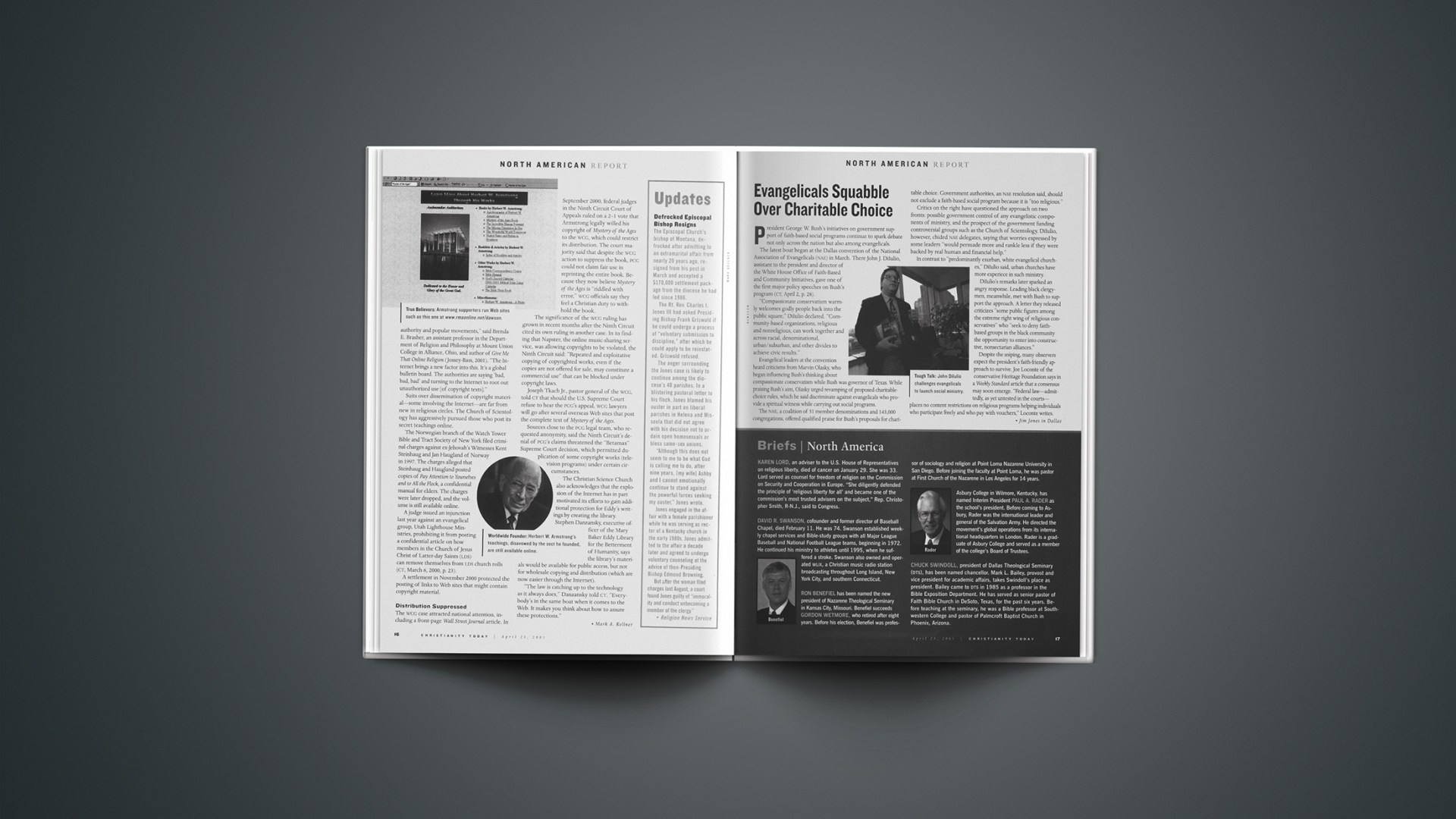Hit broadside by the unexpected evangelical criticisms, allies in Congress are moving slowly on the plan, partly to give the Bush administration time to address concerns. At the NAE convention, John J. DiIulio, assistant to the president and director of the White House Office of Faith-Based and Community Initiatives, gave one of the first major policy speeches on Bush’s program.
“Compassionate conservatism warmly welcomes godly people back into the public square,” DiIulio declared. “Community-based organizations, religious and nonreligious, can work together and across racial, denominational, urban/suburban, and other divides to achieve civic results.”
Evangelical leaders heard criticisms from Marvin Olasky, who began influencing Bush’s thinking about compassionate conservatism while Bush was governor of Texas. Olasky, professor at the University of Texas at Austin and editor of the conservative Christian weekly newsmagazine World, urged revamping of proposed charitable choice rules, which he said discriminate against evangelicals who provide a spiritual witness while carrying out social programs. Yet Olasky also praised Bush as the first federal leader in 40 years to seek partnership with religious groups.
During a question-and-answer session, DiIulio said the current proposal would make funding problematic for groups that openly evangelize while offering social services, but a voucher system might change that. After the convention, DiIulio said he would clarify the initiative to address the concerns he heard.
The NAE, a coalition of 51 member denominations and 143,000 congregations representing 30 million people, offered qualified praise for Bush’s proposals for charitable choice. Government authorities, an NAE resolution said, should not exclude a faith-based social program because it is “too religious.”
“Faith-based charities should not have to hide their light under a bushel,” the resolution said.
In other matters, the evangelical association approved a resolution urging National Religious Broadcasters to reconsider its February decision to sever ties with the NAE. The statement expressed regret for the religious broadcasters’ departure, and the board voted to restudy a controversial bylaw adopted last year that allows church groups affiliated with the more liberal National Council of Churches to hold dual membership in the evangelical association.
“We reaffirm that the National Association of Evangelicals holds as firmly as ever to its 60-year-old statement of faith that has defined our evangelical movement from its founding,” the statement says. But the resolution reaffirms the NAE’s desire to define evangelicalism “by inclusion and affirmation rather than by exclusion.”
Copyright © 2001 Christianity Today. Click for reprint information.
Related Elsewhere
See today’s related story, “Breaking Up Isn’t Hard to Do | Religious broadcasters quietly cut historic link to National Association of Evangelicals.”Jones also covered the NAE convention for his paper, the Fort Worth Star-Telegram.
The Christianity Today Weblog also covered DiIulio’s speech to the National Association of Evangelicals. The Weblog regularly keeps track of the debate over Bush’s faith-based initiatives and other items of interest to evangelicals.
Last week, Christianity Today ran a related editorial, “No More Excuses | Bush’s faith-based initiative should reinvigorate our mission of service,” and a news story, “Charitable Choice Dance Begins | Faith-based organizations cautious but eager for government aid.” Other items about charitable choice legislation can be found in our Politics & Law area.
This week’s issue of World criticizes DiIulio’s speech to the NAE, saying his blunt criticisms revealed “a lack of knowledge about the extensive charitable work of many evangelical groups” and that he doesn’t hold liberal critics to the same standards.
The Center for Public Justice Web site offers reams of information about “charitable choice” plans past and present.










